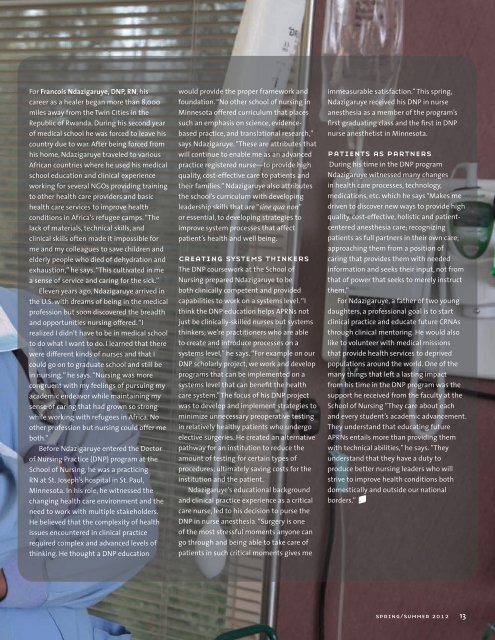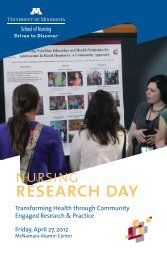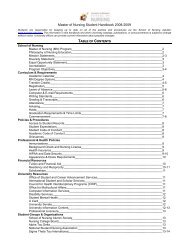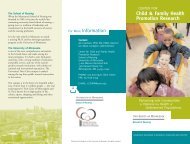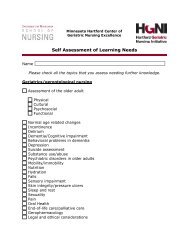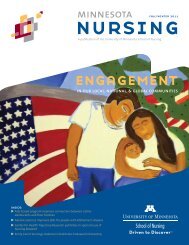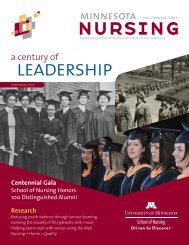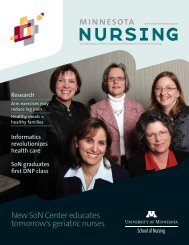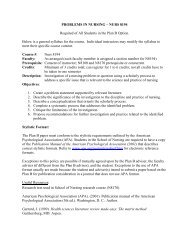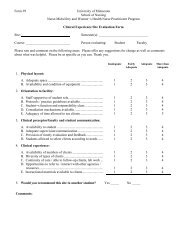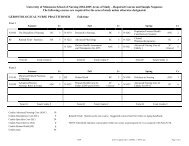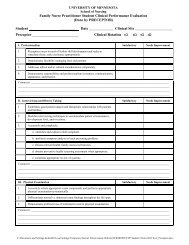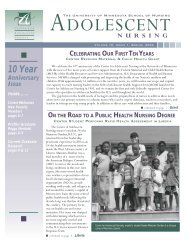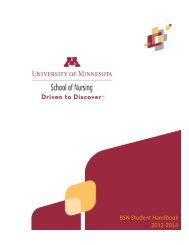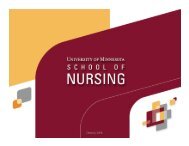Minnesota Nursing Magazine Spring/Summer 2012 - School of ...
Minnesota Nursing Magazine Spring/Summer 2012 - School of ...
Minnesota Nursing Magazine Spring/Summer 2012 - School of ...
You also want an ePaper? Increase the reach of your titles
YUMPU automatically turns print PDFs into web optimized ePapers that Google loves.
education<br />
For Francois Ndazigaruye, DNP, RN, his<br />
career as a healer began more than 8,000<br />
miles away from the Twin Cities in the<br />
Republic <strong>of</strong> Rwanda. During his second year<br />
<strong>of</strong> medical school he was forced to leave his<br />
country due to war. After being forced from<br />
his home, Ndazigaruye traveled to various<br />
African countries where he used his medical<br />
school education and clinical experience<br />
working for several NGOs providing training<br />
to other health care providers and basic<br />
health care services to improve health<br />
conditions in Africa’s refugee camps. “The<br />
lack <strong>of</strong> materials, technical skills, and<br />
clinical skills <strong>of</strong>ten made it impossible for<br />
me and my colleagues to save children and<br />
elderly people who died <strong>of</strong> dehydration and<br />
exhaustion,” he says. “This cultivated in me<br />
a sense <strong>of</strong> service and caring for the sick.”<br />
Eleven years ago, Ndazigaruye arrived in<br />
the U.S. with dreams <strong>of</strong> being in the medical<br />
pr<strong>of</strong>ession but soon discovered the breadth<br />
and opportunities nursing <strong>of</strong>fered. “I<br />
realized I didn’t have to be in medical school<br />
to do what I want to do. I learned that there<br />
were different kinds <strong>of</strong> nurses and that I<br />
could go on to graduate school and still be<br />
in nursing,” he says. “<strong>Nursing</strong> was more<br />
congruent with my feelings <strong>of</strong> pursuing my<br />
academic endeavor while maintaining my<br />
sense <strong>of</strong> caring that had grown so strong<br />
while working with refugees in Africa. No<br />
other pr<strong>of</strong>ession but nursing could <strong>of</strong>fer me<br />
both.”<br />
Before Ndazigaruye entered the Doctor<br />
<strong>of</strong> <strong>Nursing</strong> Practice (DNP) program at the<br />
<strong>School</strong> <strong>of</strong> <strong>Nursing</strong>, he was a practicing<br />
RN at St. Joseph’s hospital in St. Paul,<br />
<strong>Minnesota</strong>. In his role, he witnessed the<br />
changing health care environment and the<br />
need to work with multiple stakeholders.<br />
He believed that the complexity <strong>of</strong> health<br />
issues encountered in clinical practice<br />
required complex and advanced levels <strong>of</strong><br />
thinking. He thought a DNP education<br />
would provide the proper framework and<br />
foundation. “No other school <strong>of</strong> nursing in<br />
<strong>Minnesota</strong> <strong>of</strong>fered curriculum that places<br />
such an emphasis on science, evidencebased<br />
practice, and translational research,”<br />
says Ndazigaruye. “These are attributes that<br />
will continue to enable me as an advanced<br />
practice registered nurse—to provide high<br />
quality, cost-effective care to patients and<br />
their families.” Ndazigaruye also attributes<br />
the school’s curriculum with developing<br />
leadership skills that are “sine qua non”<br />
or essential, to developing strategies to<br />
improve system processes that affect<br />
patient’s health and well being.<br />
creating systems thinkers<br />
The DNP coursework at the <strong>School</strong> <strong>of</strong><br />
<strong>Nursing</strong> prepared Ndazigaruye to be<br />
both clinically competent and provided<br />
capabilities to work on a systems level. “I<br />
think the DNP education helps APRNs not<br />
just be clinically-skilled nurses but systems<br />
thinkers; we’re practitioners who are able<br />
to create and introduce processes on a<br />
systems level,” he says. “For example on our<br />
DNP scholarly project, we work and develop<br />
programs that can be implemented on a<br />
systems level that can benefit the health<br />
care system.” The focus <strong>of</strong> his DNP project<br />
was to develop and implement strategies to<br />
minimize unnecessary preoperative testing<br />
in relatively healthy patients who undergo<br />
elective surgeries. He created an alternative<br />
pathway for an institution to reduce the<br />
amount <strong>of</strong> testing for certain types <strong>of</strong><br />
procedures; ultimately saving costs for the<br />
institution and the patient.<br />
Ndazigaruye’s educational background<br />
and clinical practice experience as a critical<br />
care nurse, led to his decision to purse the<br />
DNP in nurse anesthesia. “Surgery is one<br />
<strong>of</strong> the most stressful moments anyone can<br />
go through and being able to take care <strong>of</strong><br />
patients in such critical moments gives me<br />
immeasurable satisfaction.” This spring,<br />
Ndazigaruye received his DNP in nurse<br />
anesthesia as a member <strong>of</strong> the program’s<br />
first graduating class and the first in DNP<br />
nurse anesthetist in <strong>Minnesota</strong>.<br />
patients as partners<br />
During his time in the DNP program<br />
Ndazigaruye witnessed many changes<br />
in health care processes, technology,<br />
medications, etc. which he says “Makes me<br />
driven to discover new ways to provide high<br />
quality, cost-effective, holistic and patientcentered<br />
anesthesia care; recognizing<br />
patients as full partners in their own care;<br />
approaching them from a position <strong>of</strong><br />
caring that provides them with needed<br />
information and seeks their input, not from<br />
that <strong>of</strong> power that seeks to merely instruct<br />
them.”<br />
For Ndazigaruye, a father <strong>of</strong> two young<br />
daughters, a pr<strong>of</strong>essional goal is to start<br />
clinical practice and educate future CRNAs<br />
through clinical mentoring. He would also<br />
like to volunteer with medical missions<br />
that provide health services to deprived<br />
populations around the world. One <strong>of</strong> the<br />
many things that left a lasting impact<br />
from his time in the DNP program was the<br />
support he received from the faculty at the<br />
<strong>School</strong> <strong>of</strong> <strong>Nursing</strong> ”They care about each<br />
and every student’s academic advancement.<br />
They understand that educating future<br />
APRNs entails more than providing them<br />
with technical abilities,” he says. ”They<br />
understand that they have a duty to<br />
produce better nursing leaders who will<br />
strive to improve health conditions both<br />
domestically and outside our national<br />
borders.”<br />
spring/summer <strong>2012</strong> 13


